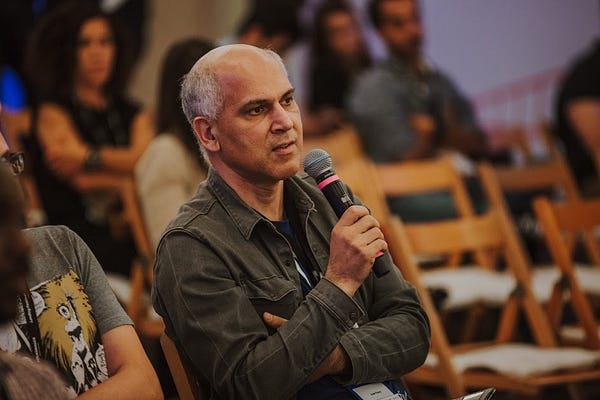
The future of work necessarily involves continuous learning and training. For José Paiva, Landing.Jobs Chairman & co-founder, the people who are most curious and eager to learn are those who adapt more easily to change. To this end, the ability to bring about some daily change in our daily lives and routines is fundamental.
However, in order to invest in lifelong training, it is necessary to rethink the current work week and break the status quo. José Paiva argues that we must move from learn-once in your early twenties to iterative training, and from the traditional eight-hour working weeks to weeks split into production and learning slots.
All of this to ensure “that we all continue to be relevant for the market”, says José, adding that learning, adapting and changing is essential so that we do not become “limpets” in all components of our lives.
How is the pandemic accelerating the pace of digital transformation in the labour market?
The pandemic is accelerating several things, namely, aspects related to the physical office, travels and such elements. But, when these issues disappear, there will be many other problems that people are not grasping yet…
For example?
The way to organize a company. The office seems an irrelevant aspect, but it is one of the most important identity symbols of a company, it is — or was — the reference. It is just like buying at a store that you know well, on your street, versus buying online, where there is still a lot of mistrust. This week I met a client at the Landing.Jobs office who questioned me how such a modern and new office had such a low occupancy rate. At some point, the client began questioning whether we even had a team.
One of the things that will be too evident is the distinction between remote work and working from home, which are very different things and some folks are associating them as being the same. One thing is remote work, in which the employee is far away from the office, hours or even days away from being able to have a physical meeting.
Another thing is work from home, in which the employee can easily go to the office if necessary, or can even work in a logic where there are weeks or days to be present at the office, and others to work from home or similar.
Will the fast pace of transformation generate more inequalities or opportunities?
It will create a lot of inequality, but I believe it will create even more opportunities. In the last few months, I have been monitoring opportunities that are related to remote working. We usually associate people’s wages with their skills, but wages are in no way associated with ability only. They’re related to a set of factors that drastically change salary outcome, and one of the topics that comes to mind is precisely the remote concept. If the wage is highly linked to the location, from the moment that location ceases to exist, remote work will heighten or try to combat the inequalities caused by the location in the first place.
The remote world — where the location is not where the employees live, but where they work from — will create fierce competition and I can easily foresee, over the next year, a skyrocketing salary for those who make the decision to stay in Portugal, for instance, but working for a company abroad. If I’m working on a remote model, why should I work for local companies and not for companies in a region that pays me (a lot) more?
Considering the remote work, we can predict that talent will be increasingly distributed geographically… Is it an opportunity to attract tech talent?
Nowadays, we have tremendous difficulty in attracting international tech talent to Portugal. We try to show the good things about the region and minimize the not so good ones, that is, we easily sell aspects such as quality of life, the sun, food, security … But there is still a lot of work left to do.
In fact, at Landing.Jobs, we’ve created an ebook to share best practices for attracting and retaining talent in Portugal nowadays, including insights on local culture and lifestyle, statistical data on the local economy, how to set up a business in Portugal and, overall, a nice overview of the Portuguese Tech Sector.
The principles of equality are attractive, but they fail at doing things well. We cannot apply an equal policy to everything because there are things that are growing and others that are dying. For instance, applying a principle of growth to a dying business does not make sense. We will only achieve mechanisms of attraction when we create specific incentives in industries that we perceive to have a high added value for a given country. When we want to attract people to a country, we must create mechanisms of inequality to increase attractiveness. The problem is that society does not accept this principle well.
With ever shorter change cycles, do Tech professionals tend to spend less time in the same company?
I think that change is more related to cultural issues than to the evolution of knowledge. If people have the principles of curiosity and willingness to learn, they can be in the same company for 10 or 15 years. It is more the cultural aspect of the human being that — and here’s the third facet — people must bring about change.
So, what can companies do to retain talent?
I’ve fought a lot against turnover and, today, I don’t know if that is positive or negative. Both companies and employees will have to look at working relationships not from a life perspective, but in the short term. The relationship must be built on a temporal basis assuming an end, and not with no end in sight. And this change in behaviour towards the working relationship is not easy to make, we always think that there is a loss when the relationship breaks down. As long as this perception persists, it will be very difficult to deal with turnover.
Given the various challenges that arise, how can professionals prepare their future career?
First, they must create a culture of curiosity. The most curious people are those who more easily adapt to change. Curiosity leads to a second aspect, which is the will to learn, the continuous learning. If a person is curious and willing to learn, it is easier to fight against procrastination, which leads to the third factor, which is to bring about change. If we don’t make small changes in ourselves, we quickly become “limpets” in everything that concerns our life. Change stimulates people.
When we created Landing.Jobs, we immediately applied this concept, starting with small things. For example, in the office, I don’t have my own physical place, because that is halfway to resisting change. In this way, I make a little change every day.
In this context of remote work and increasingly asynchronous communication, is it necessary to develop the communication and writing skills of tech professionals?
This issue has been a problem for many years. Back at Novabase, when I had a team of 200 people, more than trying to convince them to write well, I decided to hire a copywriter. Trying to get a person with difficulties in writing to write well is underproductive.
However, I believe that it is very important to provide soft skills training, namely for people to be more open, to know how to listen and to understand what the other person is saying. It is easier to do that than to help a person write very well.
Continuing training is a crucial skill in the coming decades. How will this impact our day-to-day work?
We will have to set aside some hours to learn. I’m an advocate that we must evolve from an eight-hour work schedule to a 6+2 schedule, during which the employee is producing for six hours and, in the other two, is learning. Or, alternatively, a 4+1 work schedule, in which the person is four days working and one-day learning.
We live in a society in which age is (or should be) wisdom, in which we had training and jobs for life, but we must move to a totally different standard, in which training is iterative. Only after moving to a 6+2 or 4+1 model, we can start to reduce the number of working hours.
We will probably need 30 to 50 years of adaptation, with this model, until we reach a time when we practically do not need to work because most things are already done without human intervention. But, if we want to take that leap, we must ensure that all of us, regardless of our age, remain relevant to the labour market.
We are makers of futures!
https://future.works/






0 Comments